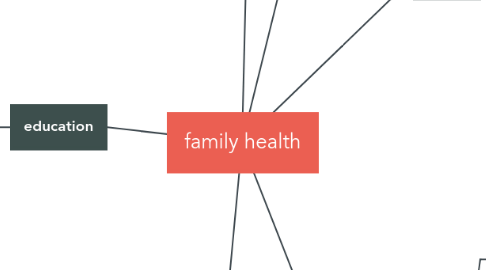family health
by William Revard

1. Demographics
1.1. the average person who does care about their health
1.2. Dietitian's would be have more work.
1.3. personal trainers would be used more often to help stay healthy.
1.4. organic farmers or people who sell produce at a famers market.
1.5. a gym owner would get more business.
2. education
2.1. could teach young individuals how they can live a longer healthier lifestyle.
2.2. everyday Physical education would help students, giving them more energy.
2.3. Require physical education in high schools to those who don't take classes
2.4. only 30% of kids participate in daily physical activity's
2.5. teaching the importance of nutrition could decrease the amount of children who are over weight.
3. technology
3.1. use to track your eating habits
3.2. look up recipes for nutrition
3.3. track your workouts
3.4. track your weight
3.5. boy tracking everything you could gage the effects on your mental health.
4. Economic
4.1. when someone feels better about their selves they have a better work ethic which means they will get more done.
4.2. if more people felt better about themselves then the unemployment rates would decrease which would help the economy.
4.3. the economic affects would be the cost of healthier foods.
4.4. the cost of equipment to stay in shape, like shoes for running etc.
4.5. eating at home like cooking, can save you money.
5. history
5.1. Exercise improves mental health by reducing anxiety, depression, and negative mood and by improving self-esteem and cognitive function
5.2. sports are a big part many countries
5.3. on november 5th, 2007, the American College of Sports Medicine (ACSM), with support and endorsement from the American Medical Association and Office of the Surgeon General, launched a global initiative with the intent to mobilize physicians, healthcare professionals and providers, and educators to incorporate exercise in their practices or activities with humans to prevent, reduce, manage, or treat chronic diseases that impact health and the quality of life
5.4. The idealism of physical perfection was one that embodied ancient Greek civilization. The appreciation for beauty of the body and importance of health and fitness throughout society is one that is unparalleled in history.
5.5. After the war finished, statistics were released about the draft with alarming data regarding the fitness levels of the soldiers. It was found that one out of every three drafted individuals was unfit for combat and many of those drafted were highly unfit prior to military training.(1) Government legislation was then passed that required improvements to the physical education programs within public schools.
6. ethics
6.1. The ethical implications of inequalities in mental health for people and nations are profound and must be addressed in efforts to fulfil key bioethics principles of medicine and public health: respect for individuals, justice, beneficence, and non-malfeasance
6.2. In light of this evidence, the ethical concerns associated with international mental health disparities are profound. Human rights and social justice frameworks are arguably central ethical tenets of public health
6.3. Key ethical issues to consider include how to make societal decisions and define values about food security that impact nutrition outcomes, and the ethical trade-offs between environmental sustainability and ensuring that individual dietary and nutritional needs are met.
6.4. the health professionals require moral reasoning.
6.5. the code of ethics has to be followed by any mental, physical health professional.


